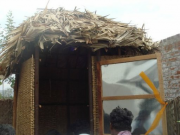UNICEF
Hand hygiene, a public policy issue
Posted on 15 Oct, 2021 08:45 AMThe simple act of cleaning hands can save lives and reduce illness by helping prevent the spread of infectious diseases. The benefits of hand hygiene in preventing the transmission of infectious diseases have been known since 1850.

Billions lack access to WASH services
Posted on 06 Jul, 2021 06:40 PMA UNICEF-WHO Joint Monitoring Programme (JMP) report on drinking water and sanitation indicates that billions of people will lack access safely

A third of world’s children poisoned by lead: UNICEF
Posted on 05 Aug, 2020 01:35 PMAround 1 in 3 children – up to 800 million globally – have blood lead levels at or above 5 micrograms per decilitre (µg/dL), a level that the World Health Organization and the United States Centers for Disease Control and Prevention have stated requires global and regional interventions.

Impact assessment of Nirmal Gram Puraskar (NGP) awarded panchayats - A report by TARU
Posted on 01 Jul, 2010 02:01 PMThe Total Sanitation Campaign (TSC) of the Rajiv Gandhi National Drinking Water Mission (RGNDWM), Govt of India was launched to cover all households with water and sanitation facilities and promote hygiene behaviour for overall improvement of health of the rural population. Panchayati Raj Institutions (PRIs) were involved in scaling up the TSC to promote large scale social mobilisation to bring about behavioural change.
Pricing options for ECOSAN toilet - A toolkit by UNICEF-SEI
Posted on 19 Apr, 2010 09:28 PM This toolkit presents various pricing options with photos of an Ecosan (Ecological Sanitation) toilet, also known as a compost pit latrine, from the work of UNICEF and Stockholm Environment Institute (SEI) in Tamil Nadu.
This toolkit presents various pricing options with photos of an Ecosan (Ecological Sanitation) toilet, also known as a compost pit latrine, from the work of UNICEF and Stockholm Environment Institute (SEI) in Tamil Nadu.
Mainstreaming ecosan into the ongoing Total Sanitation Campaign (TSC) is a major challenge in India and the unit cost of Ecosan toilet is often quoted as a major impediment. In this context, UNICEF and SEI supported a program in Tamil Nadu in 2008, towards experimenting with different Ecosan toilet super-structure options to work out the comparative cost as well as the details of operation and maintenance.
Sustainable and Ecological Sanitation - Experiences
Posted on 24 Oct, 2009 11:13 PMA consultation was organised by Arghyam Trust in September 2009, to share experiences on Sustainable and Ecological Sanitation with the Planning Commission.